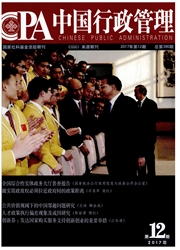

 中文摘要:
中文摘要:
中国改革开放以来一个重要的发展推动力是干部考核体制的建立与实施。考核体系里的核心指标“德”、“能”、“勤”、“绩”、“廉”中,“德”的考核往往由于缺乏硬性的衡量方法备受争议,也经常流于形式。本文通过对古今中外关于“德”的思想的讨论和回顾,说明了“德”的考量在古往今来的管理活动中的重要性及其丰富的内涵。作者结合中国现阶段的发展需要提出,“德”的核心要求应该是干部对中国发展的信心、对党领导人民从传统走向现代的伟大事业的理解、忠诚和奉献的理想主义的精神,对善恶的评价和判断能力,强烈的爱护和保护人民的公正心和正义感。在现有考核办法中,对于干部公正素质的要求和考核有必要得到进一步加强。
 英文摘要:
英文摘要:
An important driver for China' s reform and development is its cadre evaluation system. It requires the civil servants and ca dres to possess five core virtues such as being ethical, capable, diligent, meritorious, and free from corruption. Among these evaluation criteria, the most difficult is what "being ethnical" means. This paper, through a review of the different discussions on ethics over times, sorts out the important dimensions of "ethics" and demonstrates the richness of the content of "ethics" in administrative history, no matter how illusive the concept may be. Also, the authors argue that given the cur rent administrative reality, it is important to strengthen evaluation for cadres' sense of justice and dedication to serving the oeoole.
 同期刊论文项目
同期刊论文项目
 同项目期刊论文
同项目期刊论文
 期刊信息
期刊信息
